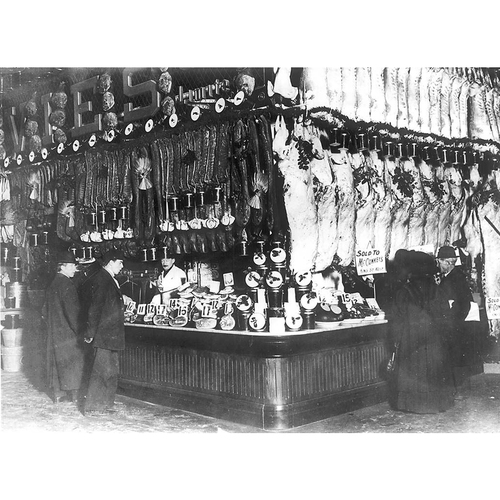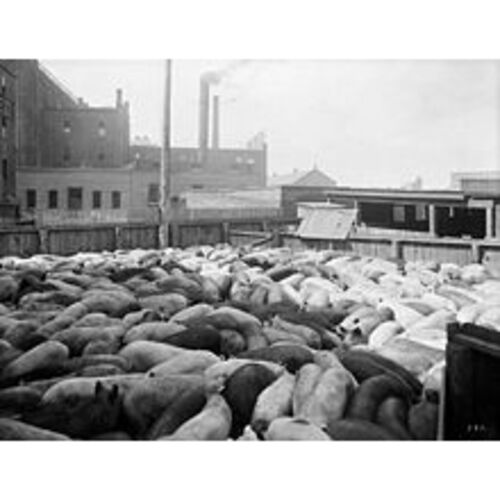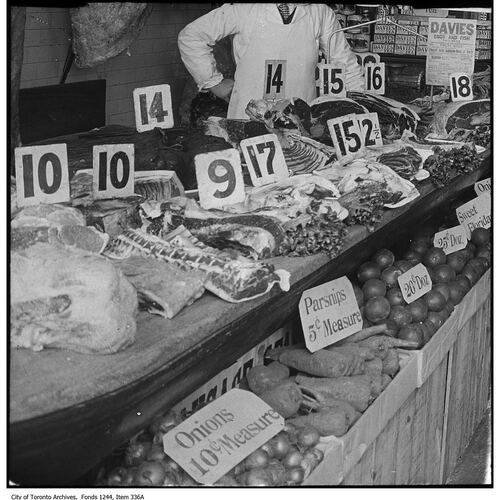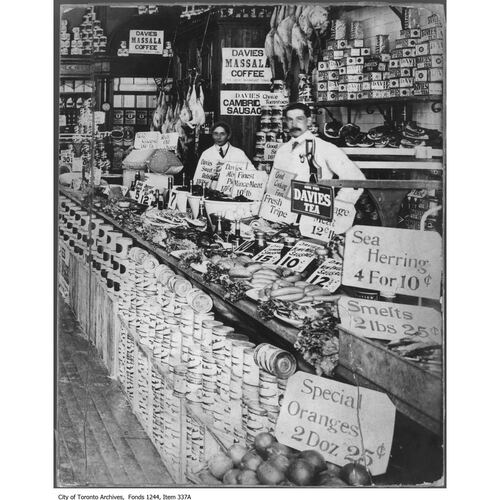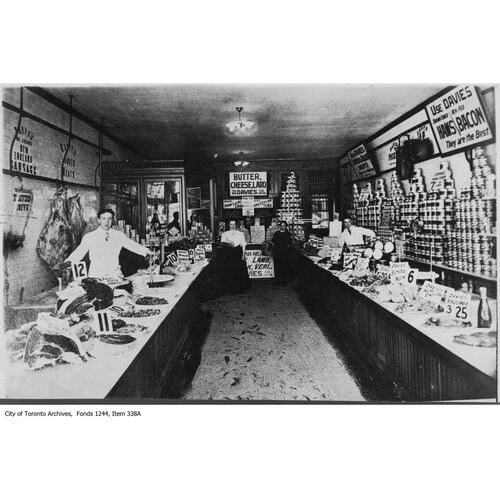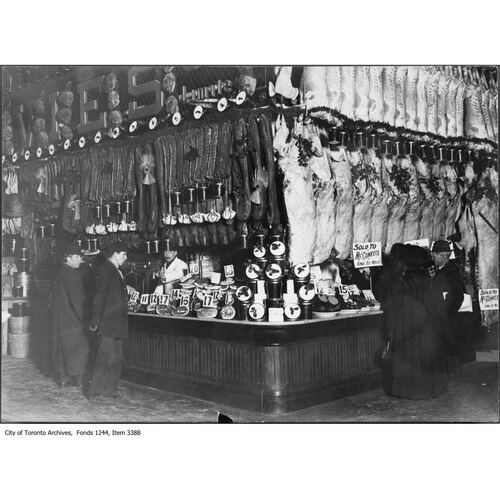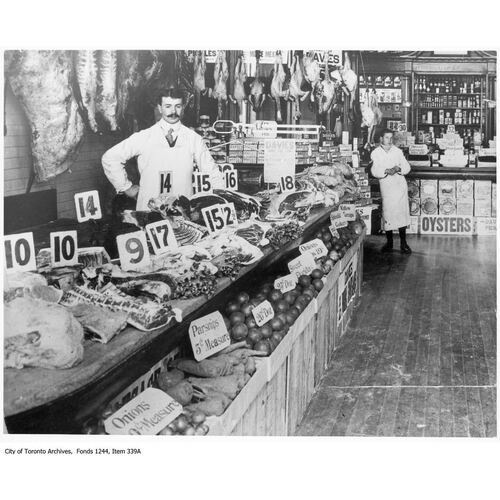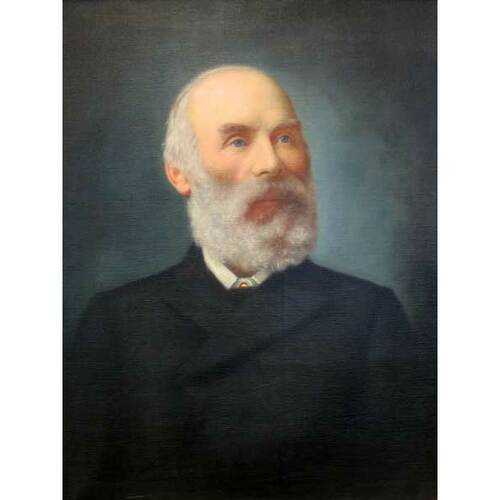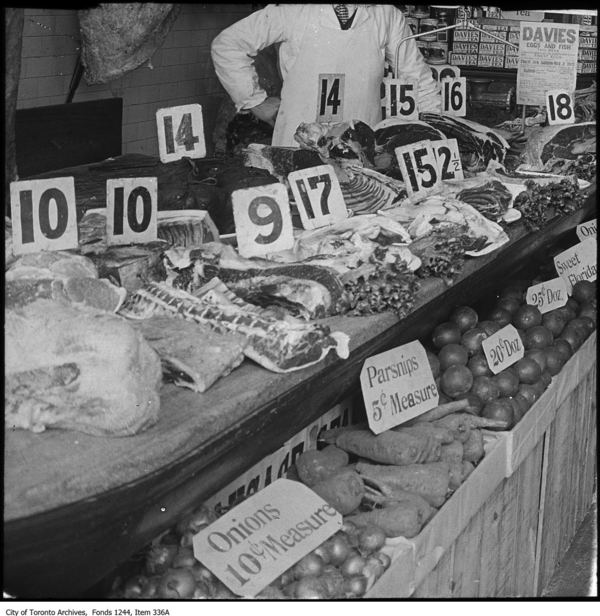
Source: Link
DAVIES, WILLIAM, meat packer and breeder: b. 23 June 1831 in Wallingford, England, son of Charles Davies and Rachel Smallbone; m. first 21 April 1853 Emma Holtby (d. 1906) in Reading, England, and they had 12 children; m. secondly 9 Feb. 1907 Rosa Bessie Talbot in Hamilton, Ont.; d. 21 March 1921 in Toronto.
A son of Baptist parents of Welsh descent on his father’s side, William Davies left school at 12 to serve an apprenticeship in trade. By his early twenties he had his own business in Reading, retailing groceries and curing meats. In 1854 he emigrated to Canada with his wife and first child, and entered the provision business in Toronto. He overcame various false starts and reverses, expanded from retail to wholesale, formed William Davies and Company in 1857, and developed an extensive trade, exporting cheese, butter, and eggs to Britain. His products, often of American origin, reflected opportunities generated by the Reciprocity Treaty of 1854.
In 1860 Davies copied several other Toronto provision merchants in beginning to ship cured sides of hogs (bacon) to England. Relatives in the south of England retailed them and begged for more. About 1861 Davies established what is said to have been the first building in Canada wholly devoted to the cutting and smoking of meats. Struggling to improve and standardize his product, he began buying hogs live rather than slaughtered, and in 1874 erected a large packing and slaughterhouse on Front Street near the mouth of the Don River.
Davies was a classic rugged individualist in business. By dint of hard work and personal austerity, constant attention to quality, reinvestment of profits, and determined innovation, he outpaced the many other Ontario packers and provision men trying to exploit British demand for North American meat. He came to specialize in exporting sides of leaner, lighter hogs, often fed on a peameal mash, and was very energetic in encouraging Ontario farmers to improve their breeds so as to differentiate their hogs from fat, heavy American porkers. Like other early meat packers, he found there was revenue in by-products such as lard; he also opened several retail outlets in Toronto. Experimental shipments of chilled beef to England in 1876, however, did not prove profitable. Davies’s volume of hogs grew from about 30,000 a year in the mid 1870s to upwards of 80,000 by 1888, more than that of all other Ontario exporters combined. Net profits averaged about $30,000 a year in the mid 1880s. Davies also pioneered in establishing a small profit-sharing scheme for his workers.
Suffering from deafness and with his two eldest sons (James and William) ill with tuberculosis in the early 1890s, Davies decided to bring in an outsider to manage the business. In 1892 he sold a 44 per cent interest in the operation to Joseph Wesley Flavelle*, an experienced provision merchant with a reputation for an earnest, church-flavoured approach to life and business, not dissimilar to Davies’s own outlook. A new firm, William Davies Company Limited, was created to take over the assets of Davies’s partnership with his sons, and Flavelle became its managing director, with Davies continuing in the business as president.
Under Flavelle’s brilliant management, and with cheap raw material available in Canada and a rising demand for lean, premium bacon in Britain, business soared. By 1900 almost half a million hogs a year were being shipped to the Davis factory for slaughter and export, shareholders were receiving in dividends close to a 100 per cent annual return on their capital, and both Flavelle and Davies had become millionaires. The Davies company was said to have been the largest pork-packing operation in the British empire, and it seems that Toronto’s nickname, Hogtown, dates from the early 1900s.
Despite this growth, Davies was a conservative force in his company’s expansion. He resisted many of Flavelle’s projects, but in the end admitted that his judgement in these matters had been wrong. In 1909 Flavelle triggered provisions in their 1892 agreement that led to Davies’s retirement from the business, although he retained a substantial minority interest. In 1919 a grandson, Edward Carey Fox, bought control of the company from Flavelle, but it faltered; in 1927 the enterprise was folded into Canada Packers Limited.
William Davies was a lifelong and ardent Baptist, and he gave generously to church causes, including McMaster University in Toronto and Brandon College in Manitoba. He also supported hospitals and sanatoria for victims of tuberculosis. An avid gentleman-farmer whose fortune had been made from the bounty of the land – he himself owned a farm near Markham and then one on Kingston Road in Scarborough Township – he was an expert in the breeding of both hogs and horses. Following his retirement in 1909, he maintained his private interests and travelled. The most important pioneer in the Canadian meat-packing industry, he died in 1921, never having recovered from injuries caused some months earlier by a goat that had butted him while he was relieving himself on a roadside in the American south.
[A small collection of William Davies papers is held at the Univ. of Western Ont. Library, J. J. Talman Regional Coll., London. Most of its contents were published as Letters of William Davies, Toronto, 1854–1861 (Toronto, 1945), edited with an introduction by William Sherwood Fox, a grandson of the subject. The collection includes various letters Davies published in agricultural journals on the need for improvements in hog breeding and the industry generally, but does not contain his important personal memoir, “The early history and development of Canada’s export bacon trade,” Farming World (Toronto), 2 Sept. 1901: 217–18. According to Canadian men and women of the time (Morgan; 1912), Davies was also the author of a memoir entitled “Reminiscences of a pioneer” (1904), but this item has not been found.
The post-1892 history of the William Davies Company, and Davies’s role in it, is chronicled in the author’s book A Canadian millionaire: the life and business times of Sir Joseph Flavelle, bart., 1858–1939 (Toronto, 1978). Many of the details of the company’s later history are derived from documents in the J. [W.] Flavelle fonds at Queen’s Univ. Arch. (Kingston, Ont.) and in the McLean family papers at the AO (F 277, MU 1127). Davies’s philanthropic activities are recorded in J. E. Middleton, The municipality of Toronto: a history (3v., Toronto and New York, 1923), 3: 84. m.b.]
AO, RG 22-305, no.43081; RG 80-5-0-370, no.21885; RG 80-8-0-314, no.2498; RG 80-8-0-802, no.2663. Berkshire Record Office (Reading, Eng.), Wallingford Baptist Chapel (Wallingford), Reg. of births, 23 June 1831 (mfm.). DCB, Biog. data file, William Davies, typescript biog. by W. S. Fox (1961). General Register Office (Southport, Eng.), Reg. of marriages, Baptist Meeting House, Kings Road (Reading), 21 April 1853. Commemorative biographical record of the county of York . . . (Toronto, 1907), 348–49. Illustrated Toronto, past and present, being an historical and descriptive guide-book . . . , comp. J. Timperlake (Toronto, 1877), 284–86.
Cite This Article
Michael Bliss, “DAVIES, WILLIAM,” in Dictionary of Canadian Biography, vol. 15, University of Toronto/Université Laval, 2003–, accessed March 31, 2025, https://www.biographi.ca/en/bio/davies_william_15E.html.
The citation above shows the format for footnotes and endnotes according to the Chicago manual of style (16th edition). Information to be used in other citation formats:
| Permalink: | https://www.biographi.ca/en/bio/davies_william_15E.html |
| Author of Article: | Michael Bliss |
| Title of Article: | DAVIES, WILLIAM |
| Publication Name: | Dictionary of Canadian Biography, vol. 15 |
| Publisher: | University of Toronto/Université Laval |
| Year of revision: | 2005 |
| Access Date: | March 31, 2025 |


